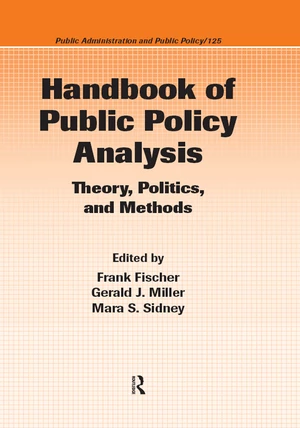The study of public policy and the methods of policy analysis are among the most rapidly developing areas in the social sciences. Policy analysis has emerged to provide a better understanding of the policymaking process and to supply decision makers with reliable policy-relevant knowledge about pressing economic and social problems. Presenting a broad, comprehensive perspective, the Handbook of Public Policy Analysis: Theory, Politics, and Methods covers the historical development of policy analysis, its role in the policy process, and empirical methods. The handbook considers the theory generated by these methods and the normative and ethical issues surrounding their practice. Written by leading experts in the field, this book- Deals with the basic origins and evolution of public policy Examines the stages of the policy-making process Identifies political advocacy and expertise in the policy process Focuses on rationality in policy decision-making and the role of policy networks and learning Details argumentation, rhetoric, and narratives Explores the comparative, cultural, and ethical aspects of public policy Explains primary quantitative-oriented analytical methods employed in policy research Addresses the qualitative sides of policy analysis Discusses tools used to refine policy choices Traces the development of policy analysis in selected national contexts The Handbook of Public Policy Analysis: Theory, Politics, and Methods describes the theoretical debates that have recently defined the field, including the work of postpositivist, interpretivist, and social constructionist scholars. This book also explores the interplay between empirical and normative analysis, a crucial issue running through contemporary debates.
Price history
Sep 14, 2022
€46.61

